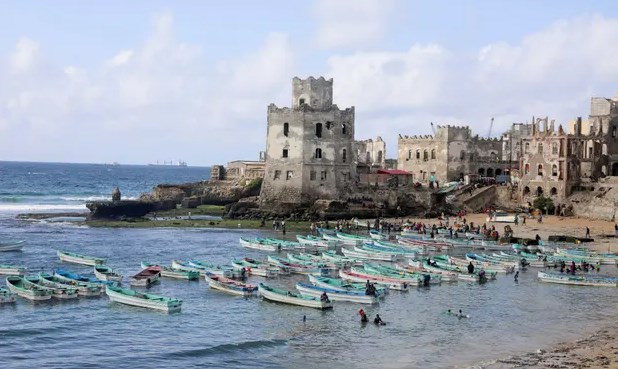
Jason Burke Africa correspondent
Wednesday July 13, 2022
Fishing boats anchored at Orobo beach in Mogadishu, Somalia. In the 1970s the city was known for its beaches, seafood and architecture, but difficult times were ahead. Photograph: Feisal Omar/Reuters
When Sir Mo Farah was living on the Horn of Africa in the late 1980s and early 90s, it was one of the most unstable and troubled parts of the continent.
Farah was born in 1983, at a moment of mounting chaos. He has said that he lived for several years in Somalia’s capital, Mogadishu, when very young, though he was not born there. The city was known in the 1970s for its beaches, seafood and architecture and was still a destination for adventurous travellers in the early years of the following decade.
But very difficult times were ahead. Despite efforts by the authoritarian leftist president Siad Barre to accelerate economic development, most Somalis continued to live precariously in deep poverty and, fuelled by fierce tribal politics, discontent intensified. Involvement in cold war proxy wars and military defeat by Soviet-backed neighbour Ethiopia also weakened the regime.
Sign up to First Edition, our free daily newsletter – every weekday morning at 7am BST
By the mid 1980s, a full-scale rebellion was under way, which eventually ousted Barre in 1991. Anarchy followed as heavily armed militias fought for control. Mogadishu suffered massive damage, and ordinary civilians paid the highest price. When famine threatened, the UN dispatched peacekeepers. These were opposed by some Somali factions and in 1993, 19 US soldiers were killed in Mogadishu when they tried to seize the leader of a powerful armed group.
By this time, Farah had not been in Somalia for some while. Ten years ago, Farah’s brother told the Guardian their family had been forced out of Mogadishu, fleeing north to Somaliland.
But the region was also chaotic, very poor and violent. The late 1980s saw battles, atrocities and massacres in Somaliland between pro-government troops and rebels.
“We were refugees. We left our business and money. We were poor, living in a very small tent in a refugee camp. The country was destroyed and there was every problem, like lack of food and power. Luckily Mo was a healthy boy,” Faisal Farah, interviewed in his home 40km from Hargeisa, the capital, said.
In 1991, after tens of thousands of people had died and the Barre regime had fallen, Somaliland declared its independence – though it is still not internationally recognised as a nation state.
Neighbouring Djibouti was relatively peaceful and so a haven for many in the region. This is where Farah was sent to live with an uncle when about eight, the athlete has now told the BBC. It was from this small, strategically situated state that he was trafficked from the UK, he said.
The weak rule of law and instability the Horn of Africa has provided opportunities for criminal networks for many decades – smuggling charcoal, other precious resources and, above all, people. Some travelled in the hope of bettering their lives, find safety from conflict or to flee persecution. Others have been sent thousands of miles against their will. Victims have long included – and still include – teenagers and young children.
Read Also:
A moment of mounting chaos: the Somalia of Mo Farah’s childhood

